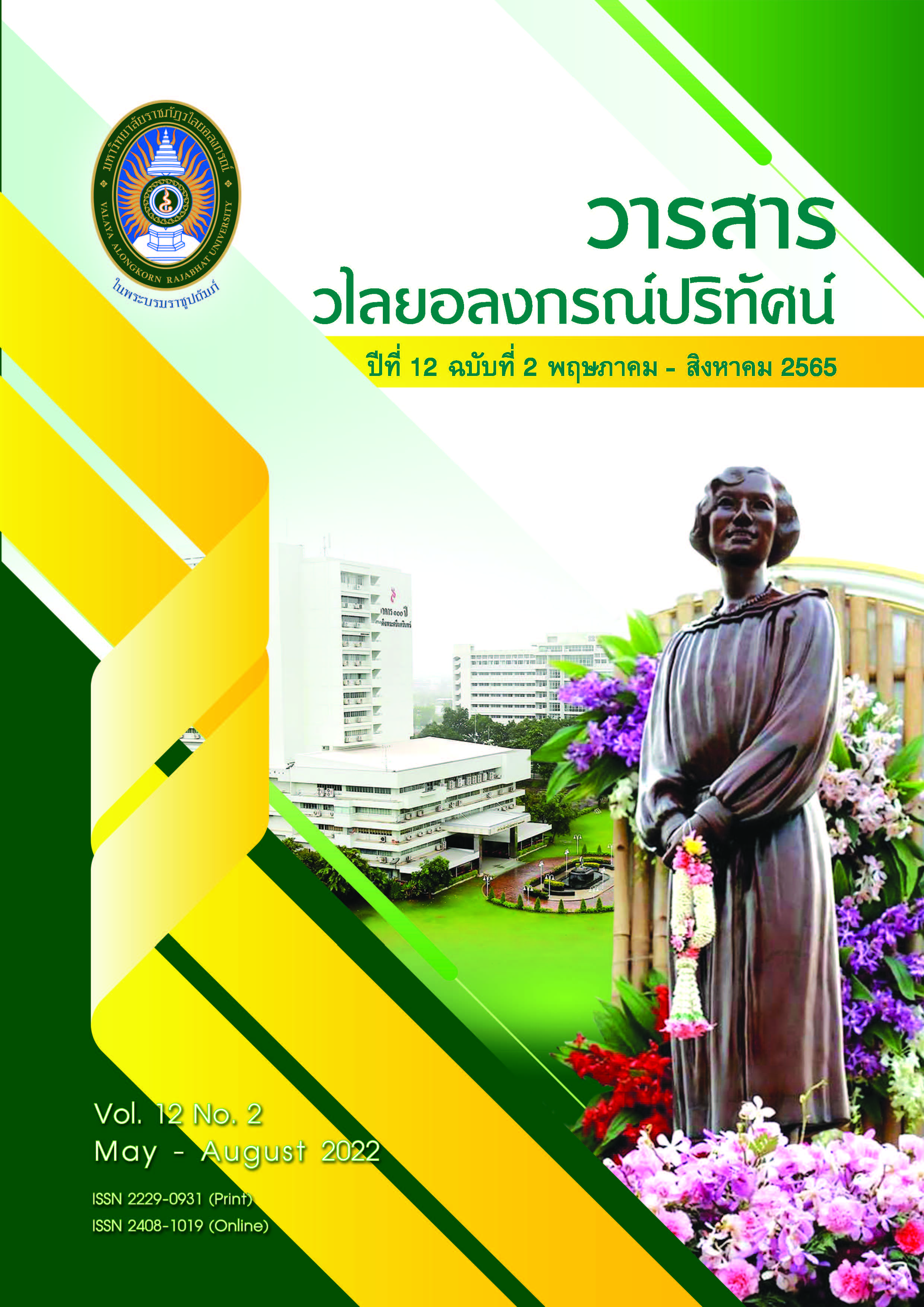การพัฒนาการท่องเที่ยวเชิงอาหารภายใต้แนวคิดเศรษฐกิจ BCG
คำสำคัญ:
การท่องเที่ยวเชิงอาหาร, ความมั่นคงทางอาหาร, เศรษฐกิจสร้างสรรค์, โมเดลเศรษฐกิจ BCGบทคัดย่อ
ยุทธศาสตร์การขับเคลื่อนการพัฒนาประเทศภายใต้โมเดลเศรษฐกิจ BCG ของรัฐบาล พ.ศ. 2564 - 2569 โดยมุ่งเน้นกลุ่มการท่องเที่ยวและเศรษฐกิจสร้างสรรค์เป็นเป้าหมายในการพัฒนาเศรษฐกิจให้เติบโตอย่างยั่งยืน เพื่อการกระจายรายได้ไปสู่พื้นที่ชุมชนอย่างทั่วถึง และลดความเหลื่อมล้ำที่เกิดจากการกระจุกตัวของนักท่องเที่ยวในแหล่งท่องเที่ยวยอดนิยม การท่องเที่ยวเชิงอาหารเป็น ส่วนหนึ่งของอุตสาหกรรมการท่องเที่ยวมีศักยภาพด้านทุนทรัพยากรที่เหมาะสมต่อแนวทางพัฒนาและมีบริบทขององค์ประกอบที่สอดคล้องกับแนวคิดเศรษฐกิจ BCG คือ ระบบเกษตร ซึ่งเป็นจุดกำเนิดของแหล่งอาหาร เรื่องราวที่มาของอาหาร รวบรวมมรดกภูมิปัญญาทางอาหาร สามารถนำมาต่อยอดสู่อุตสาหกรรมสร้างสรรค์ ดังนั้น บทความวิชาการนี้ เป็นการทบทวนเอกสารและงานต่าง ๆ ที่เกี่ยวข้องกับองค์ประกอบและกลไกเพื่อเสนอแนะแนวทางการพัฒนาการท่องเที่ยวเชิงอาหารภายใต้แนวคิดเศรษฐกิจ BCG พบว่า กลไกการขับเคลื่อนการท่องเที่ยวเชิงอาหาร ควรมีองค์ประกอบหลัก 2 ส่วน คือ “AGFEC” ได้แก่ A–Agriculture (การเกษตร) G-Gastronomic (วัฒนธรรมอาหารการกิน) F-Food Safety (อาหารปลอดภัย) E-Experience (คุณค่าทางประสบการณ์ที่ได้สัมผัส) C-Creative Entrepreneur (ผู้ประกอบการสร้างสรรค์) และองค์ประกอบร่วม 4 ด้าน ได้แก่ ศักยภาพพื้นที่ ความมั่นคงทางอาหาร การเชื่อมโยงห่วงโซ่อุปทาน และปัจจัยสนับสนุน ทั้งนี้ยังพบว่า การยกระดับห่วงโซ่คุณค่าไปพร้อมกันทั้งคลัสเตอร์การท่องเที่ยวระดับเมืองและคลัสเตอร์การท่องเที่ยวระดับชุมชน ด้วยการสร้างเครือข่ายดำเนินงานร่วมกันด้วยแนวทางการสร้างความมั่นคงทางอาหารให้ประเทศพร้อมกับการสร้างความมั่นคงให้กับทรัพยากรบนฐานการผลิตที่ยั่งยืน
เอกสารอ้างอิง
กระทรวงการอุดมศึกษา วิทยาศาสตร์ วิจัยและนวัตกรรม. (2564). แผนการปฏิบัติการ ด้านการขับเคลื่อนการพัฒนาประเทศไทยด้วยโมเดลเศรษฐกิจ BCG พ.ศ. 2564-2570. [ออนไลน์], เข้าถึงได้จาก https://waa.inter.nstda.or.th/stks/pub/bcg/20211228-BCG-Action-Plan-2564-2570.pdf
ฉันทานนท์ วรรณขจร. (2564). การประชุมเชิงปฏิบัติการ APEC Policy Partnership on Food Security Roadmap Intersessional Webinar. [ออนไลน์], เข้าถึงได้จาก https://www.bangkokbiznews.com/news/detail/940608. (2564, 16 พฤษภาคม).
ชญานิน วังซ้าย. (2557). Food Will Keep Us Alive. [ออนไลน์], เข้าถึงได้จาก http://www.etatjournal.com/web/component/tags/tag/chayanin. (2564, 16 พฤษภาคม).
ชัยนันต์ ไชยเสน. (2562). แนวทางการเพิ่มขีดความสามารถและนวัตกรรมการบริการธุรกิจร้านอาหารยุค 4.0 เพื่อส่งเสริมและพัฒนาจังหวัดภูเก็ตเป็นเมืองสร้างสรรค์ด้านอาหาร. วารสารวิทยาลัยดุสิตธานี. 13(3), 491-504.
ประชาคมวิจัยด้านเศรษฐกิจชีวภาพ เศรษฐกิจหมุนเวียนและเศรษฐกิจสีเขียว. (2561). สมุดปกชาว BCG in Action การพัฒนาวิทยาศาสตร์ เทคโนโลยีและนวัตกรรมของประเทศไทย เพื่อเศรษฐกิจชีวภาพ เศรษฐกิจหมุนเวียนและเศรษฐกิจสีเขียว. [ออนไลน์], เข้าถึงได้จาก file:///C:/Users/User/Downloads/BCG_WhitePaper201811051.pdf. (2564, 20 เมษายน).
นนทกานต์ จันทร์อ่อน. (2557). ความมั่นคงทางอาหารของประเทศไทย. [ออนไลน์], เข้าถึงได้จาก http://library.senate.go.th/document/Ext7091/7091777_0002.PDF. (2564, 20 เมษายน).
เสกสรร พาป้อง. (2560). ระบบอาหารที่ยั่งยืน. [ออนไลน์], เข้าถึงได้จาก https://www.nstda-tiis.or.th/our-rd-activities/sd-data/10yfp-scp/sfs/. (2564, 19 เมษายน).
สำนักงานปลัดกระทรวงการท่องเที่ยวและกีฬา. (2561). สถานการณ์นักท่องเที่ยวชาวต่างชาติ ม.ค. - มิ.ย. 61. [ออนไลน์], เข้าถึงได้จาก https://secretary.mots.go.th/index.php. (2564, 20 เมษายน).
สำนักงานปลัดกระทรวงการท่องเที่ยวและกีฬา. (2562). รายงานสภาวะเศรษฐกิจการท่องเที่ยว: Tourism Economic Review. [ออนไลน์], เข้าถึงได้จาก https://www.mots.go.th/download/article/article_20191025094442.pdf. (2564, 20 เมษายน).
สำนักงานพัฒนาวิทยาศาสตร์และเทคโนโลยีแห่งชาติ. (2563). BCG in Action: สาขาการท่องเที่ยวและเศรษฐกิจสร้างสรรค์. [ออนไลน์], เข้าถึงได้จาก https://waa.inter.nstda.or.th/stks/pub/2021/bcg-in-action-tourism-creative-economy.pdf. (2564, 19 เมษายน).
อัตตนาถ ยกขุน, ชนกนารถ ราชภักดี และธนิสร พิตรชญารมย์. (2563). แนวทางการพัฒนา การท่องเที่ยวเขิงอาหารในประเทศไทย. วารสารวิชาการ มหาวิทยาลัยอีสเทิร์นเอเชีย. 10(1), 60-68.
TAT Academy. (2564). การท่องเที่ยวตามแนวคิด BCG. [ออนไลน์], เข้าถึงได้จาก https://tatacademy.com/th/publish/article/e64b2554-d206-4e07-8c83-5df6a1f4fe65
TAT Review Magazine. (2011). เศรษฐกิจสร้างสรรค์. [ออนไลน์], เข้าถึงได้จาก http://www.etatjournal.com/mobile/index.php/menu-read-tat/menu-2011/menu-2011-apr-jun/107-22554-creative-economy?fbclid=IwAR0o-hasyWnaLlM0y8MxKhvpIg5bTLbCg9gJWfIfRw6wCQtQYdStfrt5q68. (2564, 17 เมษายน).
Andersson, D, T., Mossverg, L. & Therkelsen, A. (2017). Food and tourism synergies: perspectives on consumption, production and destination development. Scandinavian Journal of Hospitality and Tourism. 17(1), 1-8. https://doi.org/10.1080/15022250.2016.1275290
Baum, T. (2019). Bridging the gap: making research ‘useful’ in food, tourism, hospitality and events - the role of research impact. The Study of Food, Tourism, Hospitality and Events. Springer, Singapore.
Ellis, A., Park, E., Kim, S. & Yeoman, I. (2019). What is food tourism ?. Tourism Management. 68(2018), 250-263.
FAO & INRAE. (2020). Enabling sustainable food systems: Innovators’ handbook. Rome. [Online], Available: https://doi.org/10.4060/ca9917en
Getz, D., Robinson, R., Andersson, T. & Vujicic, S. (2014). Foodies and Food Tourism. Goodfellow Publishers. Oxford.
Hall, C. M. & Go¨ssling, S. (Eds). (2016). Food Tourism and Regional Development: Networks, Products and Trajectories. Routledge.
Hall, C. M., & Sharples, L. (2003). The consumption of experiences or the experience of consumption? An introduction to the tourism of taste. In C. M. Hall, L. Sharples, R. Mitchell, N. Macionis, B. Cambourne (Eds.), Food tourism around the world: Development, management and markets (pp. 1–24). Oxford: Butterworth-Heinemann.
Hall, C. M., Sharples, L., Mitchell, R., Macionis, N. & Cambourne, B. (Eds). (2004). Food Tourism around the World. Routledge.
Horng, J. S. & Tsai, C. T. (2012). Culinary tourism strategic development: an Asia-Pacific perspective. International Journal of Tourism Research. 14(1), 40-55.
Howkins, j. (2001). The Creative Economy: How People Make Money From Ideas. Penguin UK.
Lin, Y-C., Pearson, T. E. & Cai, L.A. (2011). Food as a form of destination identity: a tourism destination brand perspective. Tourism and Hospitality Research. 11(1): 30-48.
Okumus, B., Koseoglu, M. A. & Ma, F. (2018). Food and gastronomy research in tourism and hospitality: a bibliometric analysis. International Journal of Hospitality Management. 73(January), 64-74.
Quan, S., & Wang, N. (2004). Towards a structural model of the tourist experience: An Illustration from food experience in tourism. Tourism Management. 25(3), 297-305
Rinaldi, C. (2017). Food and gastronomy for sustainable place development: a multidisciplinary analysis of different theoretical approaches. Sustainability. 9(10): 1748.
Scarpato, R. (2000). New Global Cuisine: The perspective of postmodern Gastronomy Studies. Unpublished masters thesis, Royal Melbourne Institute of Technology
Smith, A. D. (1995). Gastronomy or geology? The role of nationalism in the reconstruction of nations. Nations and Nationalism. 1(1): 3-23.
Smith, S., & Xiao, H. (2008). Culinary tourism supply chains: A preliminary examination. Journal of Travel Research. 46(3): 289-299
The Global Sustainable Tourism Council. (2019). GSTC Destination Criteria Version 2.0. [Online], Available: https://www.gstcouncil.org
The World Food Travel Association. (2019). What is food tourism. [Online], Available: https://worldfoodtravel.org/what-is-food-tourism/
UNESCO. (2021). International Year of Creative Economy for Sustainable Development. [Online], Available: https://en.unesco.org/news/international-year-creative-economy-sustainable-development
Yeoman, I. (2008). Tomorrows Tourist: Scenarios and Trends. Elsvevier, Oxford
Yeoman, I. (2012). 2050: Tomorrows Tourism. Channel View. Bristo
Yeoman, I., McMahon-Beattie, U., Fields, K., Albrecht, J. & Meethan, K. (2015), The Future of Food Tourism. Channel View Publications. Bristol
Yeoman, I. & McMahon-Beatte, U. (2016). The future of food tourism. Journal of Tourism Futures. 2(1): 95-98.
ดาวน์โหลด
เผยแพร่แล้ว
รูปแบบการอ้างอิง
ฉบับ
ประเภทบทความ
สัญญาอนุญาต
ลิขสิทธิ์ (c) 2022 ดารณี อาจหาญ, เกิดศิริ เจริญวิศาล

อนุญาตภายใต้เงื่อนไข Creative Commons Attribution-NonCommercial-NoDerivatives 4.0 International License.
ข้อความที่ปรากฏในบทความแต่ละเรื่องในวารสารวไลยอลงกรณ์ปริทัศน์ เป็นความคิดเห็นของผู้นิพนธ์แต่ละท่าน มิใช่เป็นทัศนะและมิใช่ความรับผิดชอบของกองบรรณาธิการจัดทำวารสาร และ
มหาวิทยาลัยราชภัฏวไลยอลงกรณ์ ในพระบรมราชูปถัมภ์


